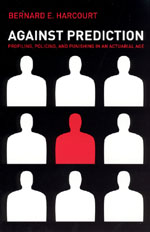Press Release: Harcourt, Against Prediction
 In order to evade charges of racism, defenders of profiling point to actuarial data to bolster their claims that profiling is the most cost-effective way to fight crime, relying on the seeming logic of concentrating police resources on the people most likely to commit crime. Meanwhile anecdotal evidence—such as Al Gore being searched—serves to challenge the effectiveness of a purely random approach and nurtures the conventional wisdom that our security depends on targeting certain people. Yet, as Bernard Harcourt brilliantly argues in Against Prediction: Profiling, Policing, and Punishing in an Actuarial Age, relying on profiling or other prediction tools can have the opposite effect—they can actually increase crime, depending on how targeted populations respond to intensified policing and the increased difficulties for certain groups, such as the recently paroled, to find jobs or pursue education. Harcourt’s compelling analysis is required reading for anyone concerned with the effects of our society’s increasing fixation on security, crime, and punishment.
In order to evade charges of racism, defenders of profiling point to actuarial data to bolster their claims that profiling is the most cost-effective way to fight crime, relying on the seeming logic of concentrating police resources on the people most likely to commit crime. Meanwhile anecdotal evidence—such as Al Gore being searched—serves to challenge the effectiveness of a purely random approach and nurtures the conventional wisdom that our security depends on targeting certain people. Yet, as Bernard Harcourt brilliantly argues in Against Prediction: Profiling, Policing, and Punishing in an Actuarial Age, relying on profiling or other prediction tools can have the opposite effect—they can actually increase crime, depending on how targeted populations respond to intensified policing and the increased difficulties for certain groups, such as the recently paroled, to find jobs or pursue education. Harcourt’s compelling analysis is required reading for anyone concerned with the effects of our society’s increasing fixation on security, crime, and punishment.
Read the press release.